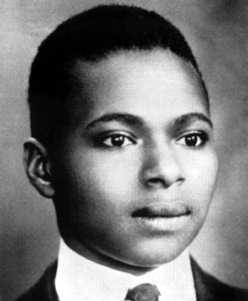
LITR 4332 American Minority Literature
Poetry Presentation 2008
Tuesday, 7 October:
Poetry presentation: Langston Hughes, "Harlem" & "Dream Variations"; Countee Cullen, "From the Dark Tower"
Reader: instructor
|
|
Countee Cullen, 1903-1946 |
Langston Hughes, 1902-1967
Best-known, most widely anthologized African American poet
Associated with "Harlem Renaissance" of African American literature, art, music and culture in 1910s-20s.
Noted for incorporating blues, jazz, and other African American folk music into poetry.
"The Whitman of African America"--made a career of poetry, wide influence on other poets
Countee Cullen, 1903-1946
Also associated with "Harlem Renaissance" of African American literature, art, music and culture in 1910s-20s.
"The Black Keats"--lyrical gift; see For a Poet
In contrast to Hughes's use of African American music, Cullen used English or European poetic models.
"Harlem" by Langston Hughes
"Harlem," first published in 1923, was revived by its inclusion in the title and epigraph of Lorraine Hansberry's play A Raisin in the Sun (1957)
Hughes, like Martin Luther King, is sometimes referred to as "The Dreamer," reinforcing the centrality of "The Dream" to African America.
5a. African American alternative narrative: “The Dream”
-
"The Dream" resembles but is not identical to "The American Dream."
-
Whereas the American Dream emphasizes immediate individual success, "the Dream" factors in setbacks, the need to rise again, and group dignity.
Preview questions: How does the poem's "dream deferred" resemble our analysis of "The Dream?"
How does the poem complicate our analysis of "The Dream?"
Harlem
by Langston Hughes
What happens to a dream deferred?
Does it dry up
like a raisin in the sun?
Or fester like a sore -
And then run?
Does it stink like rotten meat?
Or crust and sugar over -
like a syrupy sweet?
Maybe it just
sags
like a heavy load.
Or does it
explode?
Additional question(s): How does this poem appear typical of Hughes's style?
Poems by Hughes and Cullen that
anticipate "The Black Aesthetic"
(questioning, revising, or reversing the Color Code).
1d. “The Color Code”
-
Literature represents the extremely sensitive subject of skin color infrequently or indirectly.
-
Western civilization transfers values associated with “light and dark”—e. g., good & evil, rational / irrational—to people of light or dark complexions, with huge implications for power, validity, sexuality, etc.
-
This course mostly treats minorities as a historical phenomenon, but the biological or visual aspect of human identity may be more immediate and direct than history. People most comfortably interact with others who look like themselves or their family.
-
Skin color matters, but how much varies by circumstances.
-
See also Objective 3 on racial hybridity.
Preview question: How do Hughes and Cullen challenge or change the traditional values associated with dark and light?
Dream Variations
by Langston Hughes
To fling my arms wide
In some place of the sun,
To whirl and to dance
Till the white day is done.
Then rest at cool evening
Beneath a tall tree
While night comes on gently,
Dark like me--
That is my dream!
To fling my arms wide
In the face of the sun,
Dance! Whirl! Whirl!
Till the quick day is done.
Rest at pale evening . . .
A tall, slim tree . . .
Night coming tenderly
Black like me.
"From the Dark Tower"
By Countee Cullen (1903-1946)
We shall not always plant while others reap
The golden increment of bursting fruit,
Not always countenance, abject and mute,
That lesser men should hold their brothers cheap;
Not everlastingly while others sleep
Shall we beguile their limbs with mellow flute,
Not always bend to some more subtle brute;
We were not made to eternally weep.
The night whose sable breast relieves the stark
White stars is no less lovely being dark,
And there are buds that cannot bloom at all
In light, but crumple, piteous, and fall;
So in the dark we hide the heart that bleeds,
And wait, and tend our agonizing seeds.

